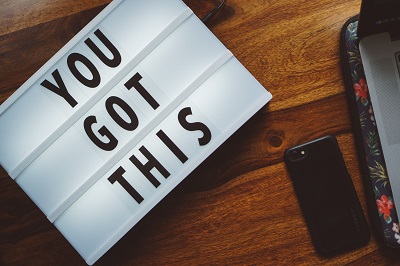Being professional is important, the words you choose and the way you convey them create an impression of you.

While saying “Got it” may be acceptable when you speak with friends or family members, try to avoid that when you talk to people you meet in a professional setting or those you work with.
A formal way to say “Got it” is to acknowledge the receipt of information and indicate what you will do with it. E.g., “Thank you, I received the drawings and will discuss them at my client meeting.”
Thank Them for the Information
Always thank that person for the information. That is a polite way to let them know you got it but also to be courteous and professional.
You can’t put a price tag on good manners; it will establish you as credible and a person with integrity when you always treat people with respect and kindness.
What to Say:
“Thank you for sending the documents to me, now it all makes sense. I appreciate you doing so and I will review them and get back to you with any questions or feedback I have.”
“That was nice of you to provide those details to me, I didn’t have that information. It will help me make an informed decision about attending that conference or not.”
“I think I understand it now, thanks to you clarifying it for me. I was making it harder than it had to be! I have saved the steps you shared with me and feel confident I can now complete that task on my own using that information.”
“The time you put into creating this spreadsheet for me is impressive. It puts it all there for me to see with ease. Not everyone would have put forth the effort to create that, but I am sure glad you did and that you shared it with me!”
“I am so happy you sent this to me, thank you for thinking of me and including me in what you sent out.”
Positive Reply
We all have aspects of work we don’t like, but how you approach it has an impact. Always send a positive reply to let someone know you got what they shared with you.
Don’t complain that now you have more work or that you don’t have time right now to go to another meeting. Instead, reflect on the fact that they communicated with you.
A positive reply, conveyed through both verbal and nonverbal cues such as body language, plays a crucial role in fostering a supportive company culture by affirming the same meaning and encouraging open communication.
What to Say:
“I will do my best to make it to that meeting, I think there will be plenty of benefit from doing so. I am working hard to fit it into my schedule at this time. I definitely appreciate the invite!”
“I received the proposal you sent over and it seems to be in-depth. I am going to review it when I have a chance to dedicate my undivided attention to it. I will be in touch with you soon!”
“I got the details you shared, thank you so much, that makes sense. It is going to save me lots of time because I don’t have to conduct research and gather those details on my own now.”
“Learning how to do this was on my list of things to do. With the information you shared with me, I have plenty to get started. I feel confident I can put this information to good use too!”
“You are the best, I can’t tell you how great it is to have you on our team! You are organized and you always share information with all of us! It doesn’t go unnoticed.”
Show appreciation when someone shares information with you or shows you how to do something.
They are investing their time to do so. That shouldn’t be taken for granted, and they will continue to communicate with you if they know how much you appreciate all they do.
Showing appreciation through formal alternatives, such as a heartfelt thank-you note or a small token of gratitude, is another way to acknowledge and honor the time and effort someone has invested in sharing valuable information and fostering positive relationships for future interactions.
What to Say:
“You have gone the extra mile to provide all of this, and it is impressive. I hope you know how much I value all you do!”
“I received your email today, thank you for those attachments. They certainly give me a visual element to add to the written materials, and I can wrap my mind around all of it that way.”
“I feel like I dropped the ball on this and had some trouble understanding the details, but you came in and picked up where I didn’t get it done. I didn’t have these pieces of information, and I am very appreciative that you provided them.”
“I am going to save so much time and reduce the risk of mistakes with what you have shown me. I wouldn’t have figured it out on my own, but I know now what I was lacking and doing incorrectly. Thank you for the learning opportunity and for being so patient as we worked through it.”
“I realize you are working extra at night and on the weekends to get all of these updates to us. It has been a tremendous help with keeping the project on task and on track for the estimated completion. I can’t wait to see how it all turns out!”
Confirm Receipt
No one wants to guess if you got what they sent to you. In this age of technology, information is shared by phone or email when it comes to business details.
Always confirm receipt of that information. Don’t be in such a hurry that you don’t let them know you got it.
You don’t have to spend very much time returning a call or returning an email.
What to Say:
“Thank you for the phone call, sorry I missed it and you got my voicemail. I just wanted to share with you that I did receive the details you shared and I have it on my calendar.”
“Thank you for sending this email, I will save this information so I can refer back to it as necessary.”
“I have received the information, thank you so much for providing it; it all makes sense now.”
“I have some questions about the materials I got from you, can we schedule a time to talk? I would like to get some things clarified and some additional information on other aspects of what you shared.”
“With your permission, I would like to share the documents you emailed to me with others at our staff meeting on Friday. The details are remarkable and I think there are many other people here that could benefit from receiving them.”
“I acknowledge receipt of the information you provided this time round. Thank you for sharing the details.”

Katie Holmes is a senior author at everyday-courtesy.com with over 15 years of experience in marketing and psychology. As a freelance consultant, she also supports companies and executives in overcoming communication challenges. Katie is a passionate digital nomad working on her first book on the art of communication.

